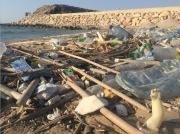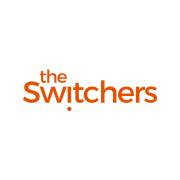

Subscríbete al SCP News
Transitioning from over consumption of single use plastic bags in Lebanon: An alternative model for an interactive and collective phase out

By Sammy Kayed and Anwar Al Shami
It’s becoming common knowledge that single use plastics are polluting shorelines and severely damaging marine ecosystems with over one million birds and 100,000 marine mammals dying each year from plastic bags alone. But the difficulties behind phasing out this cheap, lightweight, and easy to make material that pervades our consumptive lives, are immense.
What if there was a way to turn this grand challenge into the bearer of local funding and opportunities for community driven sustainable development?

Single use plastic waste loads the coast of Lebanon, photo © Sammy Kayed
We have been working with the Regional Activity Centre for Sustainable Consumption and Production (SCP/RAC) to study those possibilities in the context of single use plastic bags (SUPBs) in Lebanon and the historic Municipality of Jbeil Byblos. Our work is taking place within the EU-funded Marine Litter Med project, aiming at fostering implementation of the Regional Plan on the Management of Marine Litter, adopted by the Contracting Parties of the Barcelona Convention in 2013 to explore and implement prevention measures for the reduced consumption of SUPBs.
After dozens of consultations and hundreds of surveys with community members, shops, plastic industrialists, NGOs, and public authorities, our research is giving a first glance into the scale and patterns of consumption and production of SUPBs in Lebanon. According to the study, each Lebanese resident on average consume 596 SUPBs per year. This rate of consumption beats even the world’s most consumptive economies with the United States averaging 307 and the EU member states averaging 202 SUPBs per person per year. This means the small Mediterranean country carrying a population of 6.86 million is putting out 4.01 billion bags per year. But what makes this figure particularly concerning is Lebanon’s history of open solid waste dumping, the widespread shortage of public garbage bins, and commonplace littering which results in an untold number of plastic bags entering marine ecosystems where they break down into micro plastics, contaminate the food web, and reach our body with largely unknown impacts to human health.
But, it appears the time is ripe for change, with a whopping 60% of residents in Jbeil responding as ready to pay a fee on SUPBs. Such fees have proven themselves effective at reducing consumption of SUPBs by around 70% in just a year. The readiness of the local consumer to pay a fee on SUPBs came as a shock to both us researchers and the shop owners of whom 90% were under the impression that consumers are not willing to pay. Despite the major economic interest, shop owners were hesitant to support a fee out of a misplaced fear that their customers would purchase their goods elsewhere. As shown in the figure below, consumers reported a willingness to pay between 50 and 150 LLB per bag.

We found that across household types, customers of chain supermarkets consistently report using more plastic bags on average. Also, consumers shopping at convenience stores were consistently willing to pay more than those shopping at chain supermarkets suggesting that the smaller shops are better positioned to charge a larger disincentive fee for the use of for SUPBs. Another interesting finding for these small and medium enterprises (SMEs), is that the majority prefer to charge a SUPB fee based on the amount of the customer’s transaction instead of on the number of bags used. These results suggest that a transaction based fee for SUBPs, where the greater the purchase the greater the tax, would be easier to integrate into shops. This would be a totally new approach for the Middle East North Africa (MENA) region that could potentially address the issue of lower compliance among small and medium shops with measures to reduce SUPBs.
Whether it be an effort to ban, restrict, or reduce the consumption of SUPBs, the countries in the MENA region that have implemented government policies on SUPBs are few. These government efforts are predominantly led and instituted through a top down approach by national authorities. Despite their success in reducing the consumption of SUPBs, policies that rely on financial incentives and disincentives only result in funds that improve the bottom line of businesses and create tax revenue that’s prone to wasteful or poorly directed public spending. Both businesses and government authorities often completely miss or undervalue the opportunity to directly allocate these new funds to local sustainable development initiatives that can further enable the transition to a circular economy. In our study the great majority of respondents, claimed that they are willing to pay a fee for SUPBs if they know it will improve their local environment. The study shed more light on how phasing away from SUPBs can actually provide great financial returns to the community to expand on their pro-environmental behavior. Heightened public awareness on environmental threats and powerful local governance, continues to position Lebanon as an opportune context to pilot alternative modes of consumption and production around single use plastics and we hope to make this case via grocery bags.
To better compare both the transaction and unit based models for disincentivizing consumption of SUPBs and to visualize how financial returns can go directly into a community controlled fund for sustainable development, we created an interactive digital tool called Unclog. The tool is based on geographic, SME, public authority, industry, and consumer acquired data merged from this study and a previous one. It enables the user to choose different fee models, set the size of the fee for SUPBs, enter the municipal population, type of single use bag available in the municipality, and the level of compliance with multi-use bags to visualize how many SUPB are removed from the environment and how much money is generated for the community from a tax. The interactivity of the Unclog tool allows the user to adjust variables and understand alternative models that could be better for the environment, local community, and the public authorities attempting to transition away from SUPBs. You can get to know the Unclog tool through the following weblink.
Our IT tool development to support this transition didn’t stop there. In an effort to maximize the uptake and application of our results, we have made the survey data completely open to concerned citizens and stakeholders. We created a plotting dashboard for user produced visualizations. For the great majority of people, images speak way louder than words and through the plotting dashboard users can take any of our survey questions and variables and plot them against one another, choose different types of display graphs and plots, and customize them as they see fit. Data analysis and visualization can in itself be biased since the person or organization conducting the communication activity makes a choice to visualize and communicate certain variables and not others. You can get to know our survey results and the plotting dashboard through the following weblink. With both our plotting dashboard and the Unclog tool we hope to help move data analysis toward democratization in the belief that this is a powerful way to stimulate decision makers and make the transition to a circular economy more ethical and clear.














